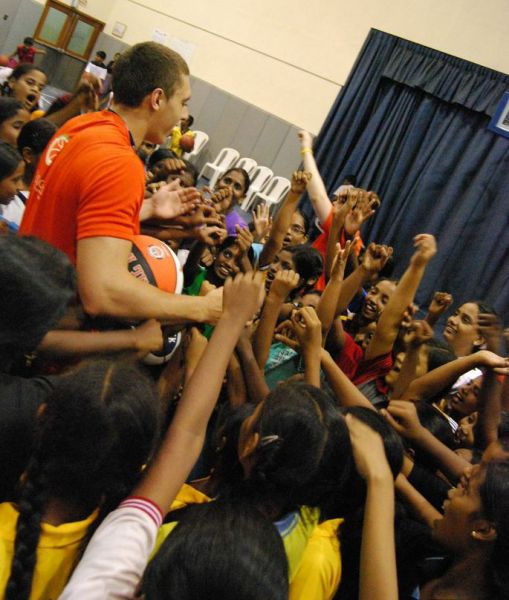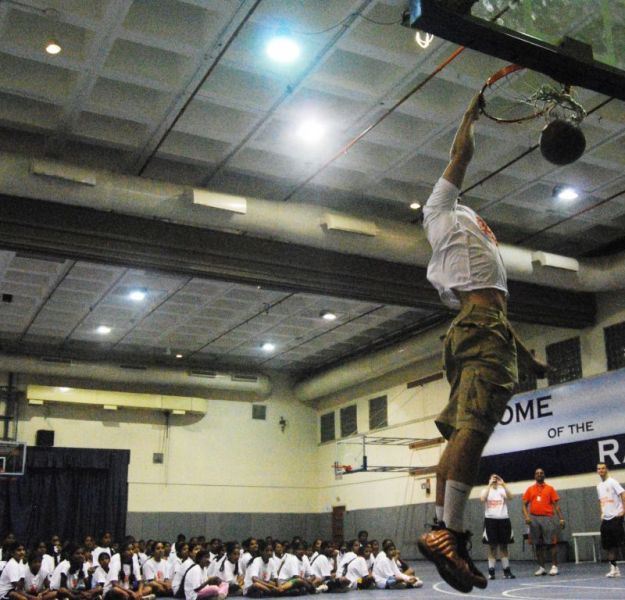02-28-2014
The following article was posted in the Harvard University South Asian Institute newsletter.
When teaching kids about basketball, the importance of rebounding is always included. But what about teaching this skill in the classroom?
According to Crossover Basketball and Scholars Academy, these types of basketball skills are just as applicable on the basketball court as they are off the court for many kids in India.
Crossover Basketball and Scholars Academy is an international basketball program in India committed to teaching basketball and to providing educational opportunities for its participants. Based in Chennai, India, Crossover uses basketball as a tool to help kids succeed in the classroom.

SAI recently talked to Jonah Travis, a junior at Harvard College studying government and economics, about his experience working at Crossover last summer. Travis is a member of the Harvard men’s basketball team.
Travis got involved with Crossover at the urging of some of his assistant coaches who were familiar with Shaun Jayachandran, the founder of Crossover. Despite never having been to India, Travis found that the experience made him realize the power of basketball: “It opened my eyes to see exactly what this game can do,” he says.
Travis served as a counselor at the camp, and worked with participants who ranged in age from 7 years old to juniors in high school. He helped the volunteers teach standard basketball skills – passing, dribbling, shooting – but took it a step further by teaching them critical skills for the classroom. Skills like teamwork, discipline, hard work, dedication and rebounding are important in basketball, and Crossover recognizes that these skills are just as important in life as they are in sports.
For example, Travis recalled asking the children about how they can make their basketball jumping better. The kids answered by saying that they should practice more, which provided Travis with the opportunity to explain that the same idea could be applied to school work like reading and writing. The same could be said for skills like discipline and teamwork.

“We are able to teach them different life lessons that basketball teaches them, and show they that you can apply basketball to what you learn in other aspects of your life,” Travis says. “You don’t have to be so tunnel-vision with the sport.”
Not only was Travis able to share his basketball skills, he was also able to serve as a mentor and an example of someone who has gained educational opportunities because of basketball; playing basketball professionally does not have to be the only way to succeed. Crossover uses basketball as a tool to provide necessary skills to succeed in higher education.
When asked why basketball, as opposed to other sports is able to have such an impact for kids in this area, Travis explains it is because of accessibility: “You can pick up and play anywhere and you can even make your own hoop. It’s everywhere.” Playing a game does not require any shared language.
In India, Travis explained that basketball is seen as separate from education, and in general, a revenue-generating activity. In the US, in contrast, sports are seen as going hand-in-hand with educational opportunities, and Travis’s experience at Harvard serves as an example of what basketball can provide. Crossover tries to present the youth in India with an alternative way to approach sports.
In Travis’ experience, the children at the school were extremely enthusiastic to learn more about both basketball and life skills. Some walked for miles each day to attend the camp, and he says that although some of the children did not even have shoes, they were still extremely enthusiastic about playing.
“If I can give them an idea of what basketball can do for them, it might spark their interest, and they might pass that to the next person,” he says. “They were so eager to learn everything.”
Moving forward, Travis and Jayachandran hope to continue growing the organization and possibly start a more formal partnership at Harvard.
